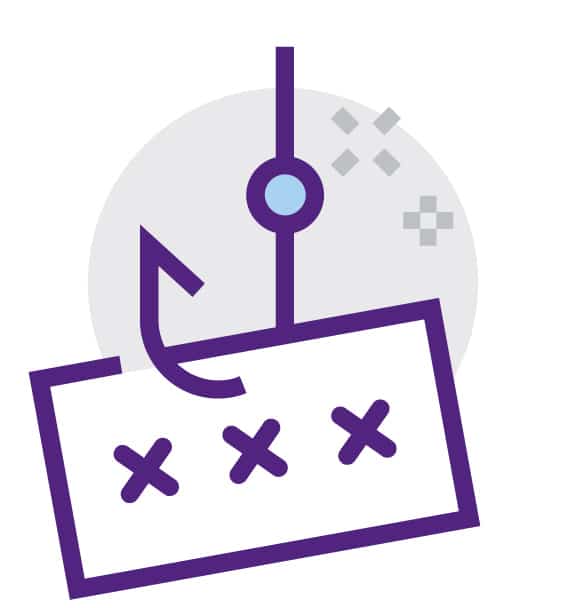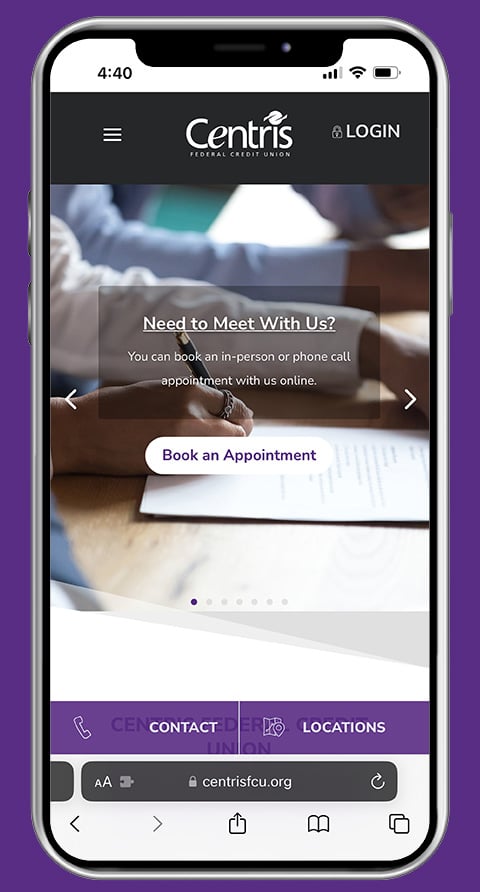Member Protection Center
Knowledge is your best defense against fraud. Our Member Protection Center empowers you with the tools and information you need to recognize scams, protect your accounts, and act quickly if needed.
The Latest in Fraud Protection
Protect Your Money: Advanced Debit Card Fraud Protection
Scammers are constantly evolving their tactics, often by mimicking fraud alert text messages to trick you into revealing sensitive information. Once they have your details, they can drain your account in minutes.
With the Centris Debit Card Companion App, you can outsmart scammers and enhance your debit card security with real-time tools!
Key Features of the Debit Card Companion App:
Real-time Transaction Alerts
Customizable Transaction Controls
Manage your spending by setting limits. You can automatically deny transactions over a specific amount (e.g., $100) or restrict certain transaction types to ensure your card security fits your lifestyle.
Instant Remote Card Lock
If you lose your card or suspect a scam, you can turn your debit card off instantly with one tap. If you find it later, simply toggle it back on.
Easy Travel Notices
Avoid declined transactions while on vacation. Set travel notices directly in the app to ensure your card works seamlessly wherever your journey takes you.
Fraud Awareness and Education
As your trusted financial partner, our responsibility is to educate members of our community about fraud and identity theft, and how to prevent it. Below is information to help you stay vigilant against fraudsters and scammers.
What are some common scams?
What is phishing, smishing, vishing?
How can I keep minors safe in a digital world?
How can I protect elders?
How do I protect my business?
How can I protect my identity?

A general rule of thumb to follow is if an offer seems too good to be true, it probably is. Here are a few common types of scams to be aware of:

Phishing, smishing, and vishing are types of social engineering attacks designed to entice individuals to share sensitive personal information. The difference is in how individuals are targeted. Always verify the source of messages/calls, be skeptical of unsolicited messages/calls, and enable multi-factor authentication (MFA) for all online accounts.

Today’s youth have grown up surrounded by computers, tablets, smartphones, the internet, and social media. Education is key when it comes to helping protect them while they are online. Here are some steps you can take to help ensure their safety:
- Teach them the importance and responsibility of keeping their login credentials and personal information confidential.
- Help them set their social media accounts to private.
- Let them know it’s OK to ignore texts or phone calls from unrecognized numbers and show them how to block these numbers.
- If they have a Centris Visa® Debit Card, download the Centris Debit Card Companion App to create transaction alerts, set spending limits, lock and unlock their card, and more.

According to the FBI, millions of elderly Americans fall victim to some type of financial fraud or confidence scheme. To help prevent elderly financial abuse, it is important to closely monitor and manage their finances responsibly:
- Regularly check in with elderly people in your life.
- Encourage elderly individuals to stay connected with friends, family, and community groups.
- Screen caregivers, including background checks and references.
- Regularly review bank statements and financial records for suspicious activity.
- Report suspected abuse to Adult Protective Services.

Staying vigilant is crucial for protecting your company’s financial and operational integrity. Proactive strategies like regular risk assessments can help reduce your organization’s exposure to fraudulent activities. Below is a list of common business scams:
- Business Email Compromise
- Phony Invoices
- Overpayment Scam
- Directory Scam
- Charity Pitches Scam
- Phishing

Identity theft is a serious cybercrime where unauthorized individuals exploit personal information to conduct fraudulent financial transactions or activities. Identity theft can impact individuals across all demographics and financial backgrounds. Check out our blog article, How to Protect Yourself from Identity Theft, for great tips on how to help prevent identity theft from happening to you or a loved one.
Proactively Prevent Fraud
Centris Federal Credit Union offers many ways to take control of you finances and proactively prevent fraud. Hover over each tile to learn more.

Online Banking Alerts

Debit Card Companion App

Monitor Credit Reports
Click here to download our informational flyer that provides more details on how to stay vigilant against fraudsters.

Steps to Take if You’ve Been Scammed
-
Change your online banking username and password and don’t share it with anyone.
-
If you downloaded anything from the scammer, have a professional or reputable antivirus program scan your device for malicious software.
-
Monitor your credit report and dispute fraudulent charges on your account with your financial institution.
-
Book an appointment with an expert at your financial institution.
-
If you are a Centris Visa® Debit Card holder, download the Centris Debit Card Companion App.
Protect Yourself at Crypto ATMs in Nebraska
Staying safe in the digital world is a team effort. That’s why we want to make you aware of a Nebraska law that provides a clear path for consumers who are scammed at crypto ATMs located in Nebraska. If you’ve been a victim of fraud, this legislation allows you to seek a refund from the ATM owner, provided you follow the specific steps.
Click the button below to read the Nebraska Department of Banking and Finance’s FAQs they put together on this law.
How will Centris contact me?
As a friendly reminder, Centris will never contact our members asking you to verify your account number, credit or debit card number, social security number, PIN, Secure Access Codes or online banking username or password. Members should take note of suspicious texts that come from unknown numbers, and that may include unformatted text with possible misspellings. These texts may also include an illegitimate link. Never click a link from an unknown sender. If someone emails, texts or calls you asking for your personal information, hang up and contact Centris immediately at 402-334-7000.
Phone
- Our Member Protection Team will reach out to a member if they believe there is risk of fraud on an account.
- We will never call and ask for sensitive personal information.
Secure Access Codes (SAC)
- SAC may be sent via text or phone call to authenticate your identity when logging into Centris online banking.
- You should never provide this code to anyone.
Debit Card
- Visa® Fraud Protection (Debit Card): If the Visa team detects suspicious activity with your debit card, they will contact you via email, phone call, and/or text.
- Their communication will never include links and will not require your account information, such as PINs or card numbers.
Text Alerts
- If you’ve enrolled in alerts through Centris mobile banking or the Centris Debit Card Companion App, you may receive text and/or email alerts.
- For these alerts, we will never ask you to click a link or provide personal information including credentials.
- If you have a loan with Centris and missed a loan payment, you may get a reminder text regarding the payment from 402-315-2650. This text will include a link to make a payment. If you have any concerns or are unsure if the text is coming from Centris Federal Credit Union, you can find the ‘Make a Payment’ link on our homepage at www.centrisfcu.org.
- If you apply for a digital loan with Centris you may receive text communications regarding your loan status from 402-697-6665.
Credit Card
- If there is potentially fraudulent activity with your credit card, Elan will call the card holder.
- They will never ask you for your card’s CVV (three-digit code on the back of the card) or issue/expiration date.
The Rise of the Phantom Hacking Scam
The FBI is warning about a highly sophisticated new fraud called the Phantom Hacking Scam.
Scammers are impersonating your bank or credit union, frantically calling to tell you your account has been “hacked.” Their goal? To panic you into immediately transferring your money to a “safe” account — which is really just theirs. They may also try to trick you into downloading an app that gives them remote control of your phone.
Read our latest blog article to learn how to protect yourself from these scams.